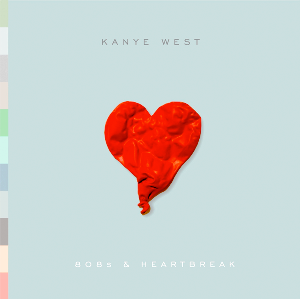A turning point for hip-hop that echoes nearly a decade later
Claude Brun, Staff Reporter
Originally published December 6, 2017
★★★★★
The most important things to consider when discussing Kanye West’s 808s & Heartbreak is both Kanye’s position in life during its recording as well as the impact it has on modern hip-hop today.
Kanye’s first three albums all carried a college theme that was conveyed through their titles and album artwork, but with the trilogy concluded, Kanye was ready to tackle a completely new style of rap music. Driven by two massive changes in his life: his mother’s death and the ending of his engagement to his long time partner Alexis Phifer. These two depressing changes in Kanye’s life gave his new sound a depressing edge that was rarely heard in rap music before this time.
While most rap songs of the early 2000s, especially those on Kanye’s previous project, Graduation, contained mostly braggadocious bars about money, booze, bitches, success and of course, drugs, Kanye’s new take on the genre focused more on all the emotions brought out by the tragic changes in his life. In 2017, Graduation, in all its glory feels like a dated time capsule from the bling era of hip-hop, while 808s was an ahead-of-its-time masterpiece that is finally coming into its own today.
On top of that, this “rap” album contained very little actual rap from Kanye, instead, he focuses on singing his bars which he then creatively processed, largely through his creative use of autotune in a way that adds an extra layer of complexity. This set a precedent for music in the following years as Kanye showed that autotune can be used to make music more creative and sonically impactful which ran in contrast to its use in most pop music, which just made songs sound more cookie cutter and artificial.
Furthermore, 808s has started to have a greater impact on modern rap. Rappers like Travis Scott now use auto tune to their advantage, giving themselves unique voices and sounds. Much of today’s rap also shows a focus on melodic deliveries over spacey and ambient beats, which are clearly inspired by what Kanye started on 808s.
This recent resurgence of interest in the sound of 808s also could be contributed to the clear 80s influence shown on the record, as the sound of the 80s is more relevant than ever in music today. Kanye uses retro synths and almost cheesy sounding melodies that would have been right at home 30 years ago, but it’s okay here because they’re just so catchy that you can’t help but hum along. In recent years, this quintessentially 80s sound has made its way back into pop music, years after Kanye rediscovered its potential.
In 2008, Kanye reintroduced the musical world to a plethora of unique, seldom heard sounds as well as asserting his own personal spin on them, and today, this album has become more relevant and interesting to listen to than ever. Every song is different from the last in sound, but the tone is still somehow consistent, Kanye’s very own emotions are felt more by the listener than in any album before (or arguably after) its release and, most importantly, it has become more relevant than ever today. All these things make 808s one of the most irresistibly slappin’ albums you can listen to today, despite the fact that it’s nearing its tenth anniversary.

























